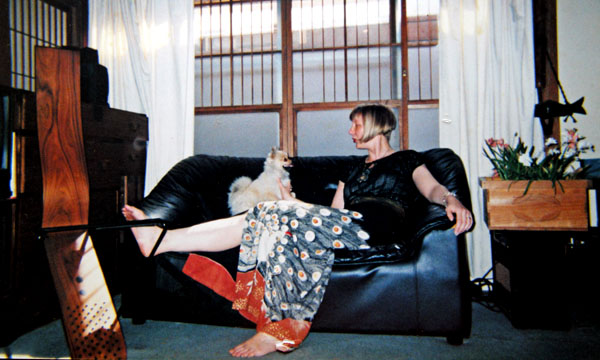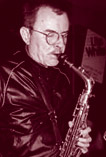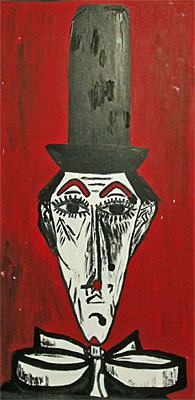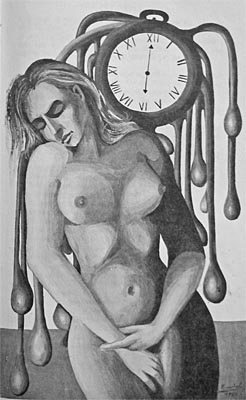|
Biographical Log of Michael Furstner - Page 201
09 | 10 ||
2011 :
Jan |
Feb |
Mar |
Apr |
May |
Jun |
Jul |
Aug |
Sep |
Oct |
Nov |
Dec || Page :
Previous |
Next
The Martinshof Story -
A Philosophy of Happiness -
Life Awareness -
Maps & other Text series
Most Recent -
Next -
Previous -
Page 1 -
Photos -
MP3s -
Maps & Text series -
Jazclass
Friday & Saturday, March 11 & 12 2011
(diary, art, literature)
 The regular reader of my Blog entries will no doubt have perceived that I just love
to connect different thoughts, ideas, observations in order to arrive at a new
perspective or proposition.
The regular reader of my Blog entries will no doubt have perceived that I just love
to connect different thoughts, ideas, observations in order to arrive at a new
perspective or proposition.
For weeks now a few unrelated ideas have swirled around
in my mind which I did not quite know what to do with. But just now (perhaps stimulated
by a generous sip of VSOP Courvoisier cognac) I feel that some thoughts are starting to
fall into place. So lets see what comes out off it.
Here we go.
1 - In the summer of 1958 I arrived on my own at
the small village of Felechas (in
Asturias, Northern Spain) to set up camp for a 6-week Geological fieldwork exercise
there. It was here, that I started to learn Spanish.
Every night I would go to the
local pub (an austere room in a private house, furnished with a couple of benches on
either side of a large rectangular table and a small bar top in a corner, all of
clean scrubbed bare greyish timber) and mix it with the locals, aided by
no more than a pocket size Spanish-Dutch dictionary. I progressed quickly and within
the 6 weeks became, although not fluent, quite comfortable with their
language.

The following summer (1959) I spent 2 months in Galicia (just north of Santiago de Compostela). When on my
return journey to Holland, I stayed for one week in Felechas, with Julio (the local
grocery store
owner) and his family, which I had befriended the previous year.
"Miguel", they cried out in disbelief "where have you been? Your language is terrible!!". Galicia
(much like the NT in Australia) was (and I presume still is) a much rougher place than
Asturias or anywhere else in Spain. Its inhabitants use a rather crude, dirty words
spiced, language, and while there I had unconsciously taken over their way of
speaking.
 2 - In 1992 my daughter Babette and her
partner Doug went to live in Japan, where they stayed in Yokohama for 7.5 years.
Upon their return I was much surprised to hear them speak with a distinct
American
accent.
2 - In 1992 my daughter Babette and her
partner Doug went to live in Japan, where they stayed in Yokohama for 7.5 years.
Upon their return I was much surprised to hear them speak with a distinct
American
accent.
Why ? I asked.
Because most of their English speaking friends and
acquaintances in Tokyo originated from the USA.
The above two examples illustrate a very important point. We are, often unconsciously,
affected by the environment we place ourselves in. This applies not only to
language, but also to our nature, personality and many of our habits.
Once we are aware of this process of environmental assimilation we
can use it deliberately to our advantage. And of course this is quite common (and has
been for centuries) in the various domains of art.
 Throughout my studies at the Adelaide Jazz College (1984-90) I spent a lot
of time listening to my favourite artists : Gerry Mulligan, Ronnie Ross (both great
baritone sax players), Charlie Parker, the Modern Jazz Quartet, Louis Armstrong, and
many others. Why?
Throughout my studies at the Adelaide Jazz College (1984-90) I spent a lot
of time listening to my favourite artists : Gerry Mulligan, Ronnie Ross (both great
baritone sax players), Charlie Parker, the Modern Jazz Quartet, Louis Armstrong, and
many others. Why?
Firstly to get a clearer perception of how I wanted my own tone to sound like on the
baritone
saxophone.
And secondly to assimilate and raise myself to the
language and level of ultimate expertise which top players represent. (For example, I did not want to sound just like the Australian Jazz saxophonist Barry Duggan, but his playing greatly inspired me and helped me to appreciate and understand that level of artistry he was part of.)
 A similar approach is common in other forms of art, like the copying of famous
paintings by many young artists as part of their training for example. (I too have done a bit of that and found that it brought me much closer to the artists and their art than simply looking at their paintings.)
A similar approach is common in other forms of art, like the copying of famous
paintings by many young artists as part of their training for example. (I too have done a bit of that and found that it brought me much closer to the artists and their art than simply looking at their paintings.)
I find that this also applies to literature.
I have attempted, at a few instances in this Blog, to define what is literature
and what is not. But having immersed myself in literature for some extended period of time, I now
find that a definition has become irrelevant to me. I feel I have arrived (so to
speak) in "the zone".
I touched upon this earlier (while reading a novel by Jennifer Donnely) but was reminded of it again when starting on a novel by Sydney Sheldon this afternoon, a succesful writer of film
scripts, TV series and novels. He is a competent, rather racy, entertaining story teller, but
he decidedly does not write literature.
Sheldon's novels are full of
adventure, glamour and sensationalism. But his
writing lacks (I believe) one vital dimension : it does not touch the soul!
I hope you don't consider me a snob here. It has taken me quite some time before I
turned to "literature", for it requires patience and perhaps a reposive mind,
which I only acquired these last 5-10 years or so.
But, having exposed myself to much of this exquisite art form at this point, I find (with great satisfaction) that I now can recognise what is
literature (and what is not) by reading a mere single paragraph or two.
Simply put,
it pulls (or fails to pull) you up into a zone of emotional, mental or
philosophical
nourishment. No further definition or tell tale sign is required. You just know it intuitively. Because
minutely, perhaps even unconsciously, you have been enriched or inspired as a person.
Most Recent -
Next -
Previous -
Top -
Page 1 -
Photos -
MP3s -
Maps & Text series -
Jazclass
Sunday , March 13 2011
(diary, music, literature)
I slugged through part of Sydney Sheldon's "The Sands of Time", hoping that something
would eventually grab my interest, but after 25 pages of it I gave up the fight and put
the book away. Not all was lost however, for the experience gave me an instant idea
for an analogy in music.
|
Entertainment novels are little more
than a story line, pure and simple.
The domestic language through which it is
conveyed add little or nothing to the reading experience. It is therefore like a
melody line in music without an underlying chord progression to enhance
it.
Because of the unimaginative language used all the interest of the novel must
therefore come from the story line alone, which in consequence is often exaggerated,
caricature, unrealistic, and over the top (Sheldon, Follet, Courteney, etc.).
Literature, on the other hand usually consists of a much
more subdued story line, which shares the limelight with the imaginative language by
which it is expressed and the cameo ideas and sub-issues by which the language is
embellished.
It is like a melody line enhanced by the mood and deeper
emotional meaning, provided by the chord progression.
The story line tends to be much more realistic, normal, true to life, as a large part of
the interest comes from the language in which it is expressed.
|

|
|
A supreme example in music would for example be Gounod's austere, almost haunting
Ave Maria, underlain by the beautiful harmony of J.S.Bach's Prelude Nr.1
(of his "Album für das Weltemperiertes Klavier").
|
 Perhaps predictably, and unlike literature which lives on for centuries, even millennia,
entertainment novels usually have a rather short shelf life, a decade or
two perhaps if they are lucky, after which they are replaced by works of more recent
writers.
Perhaps predictably, and unlike literature which lives on for centuries, even millennia,
entertainment novels usually have a rather short shelf life, a decade or
two perhaps if they are lucky, after which they are replaced by works of more recent
writers.
But there is a huge demand and indeed a need for entertainment novels.
The young to middle aged person, in the middle of raising, rearing and providing for a
family, after a hard day's work at the office, comes home with little desire to think.
He/she simply wants to relax, think of nothing and be entertained. If the TV
does not do it an undemanding adventure-, love- or who-done-it story might be just the
ticket. I myself have been there, for many years.
Only when the family obligations are behind us, we are retired from our jobs, do we
perhaps look for something more than just entertainment. We want to be mentally engaged,
enrich ourselves and that is when literature perhaps takes over.
That, in a nutshell is certainly my own story. Is it yours too?
Most Recent -
Next -
Previous -
Top -
Page 1 -
Photos -
MP3s -
Maps & Text series -
Jazclass
Monday & Tuesday , March 14 & 15 2011
(diary, philosophy of happiness)
 My series A Philosophy of Happiness seems to have a life
on its own. Every time I think I have reached the end there is a knock on my door
"Michael have you thought of this?"
So I have been busily writing away again for the last two days to complete a 14th episode.
My series A Philosophy of Happiness seems to have a life
on its own. Every time I think I have reached the end there is a knock on my door
"Michael have you thought of this?"
So I have been busily writing away again for the last two days to complete a 14th episode.
Through my various contemplations around the writing of my Blog, I get acquainted with
lots of interesting people, both alive and from the past. This week it has been the
young English poet John Keats, who tragically died of tbc in 1821, age only 25
years.
Knowing his short future and keen to write he focused on poetry (believing he
had not enough time left to master writing prose), and in 4 short years managed to make
a wonderful lasting contribution to poetry.
Keats poem Ode on a Grecian Urn inspired me to write above mentioned Episode 14. I won't duplicate it hear, so just click on
the link in order to access and read it.
Comments -
Most Recent -
Next Page -
Previous -
Top -
Photos -
MP3s -
Maps & Text series -
Jazclass
Copyright © 2011 Michael Furstner
|



 Throughout my studies at the Adelaide Jazz College (1984-90) I spent a lot
of time listening to my favourite artists : Gerry Mulligan, Ronnie Ross (both great
baritone sax players), Charlie Parker, the Modern Jazz Quartet, Louis Armstrong, and
many others. Why?
Throughout my studies at the Adelaide Jazz College (1984-90) I spent a lot
of time listening to my favourite artists : Gerry Mulligan, Ronnie Ross (both great
baritone sax players), Charlie Parker, the Modern Jazz Quartet, Louis Armstrong, and
many others. Why?


